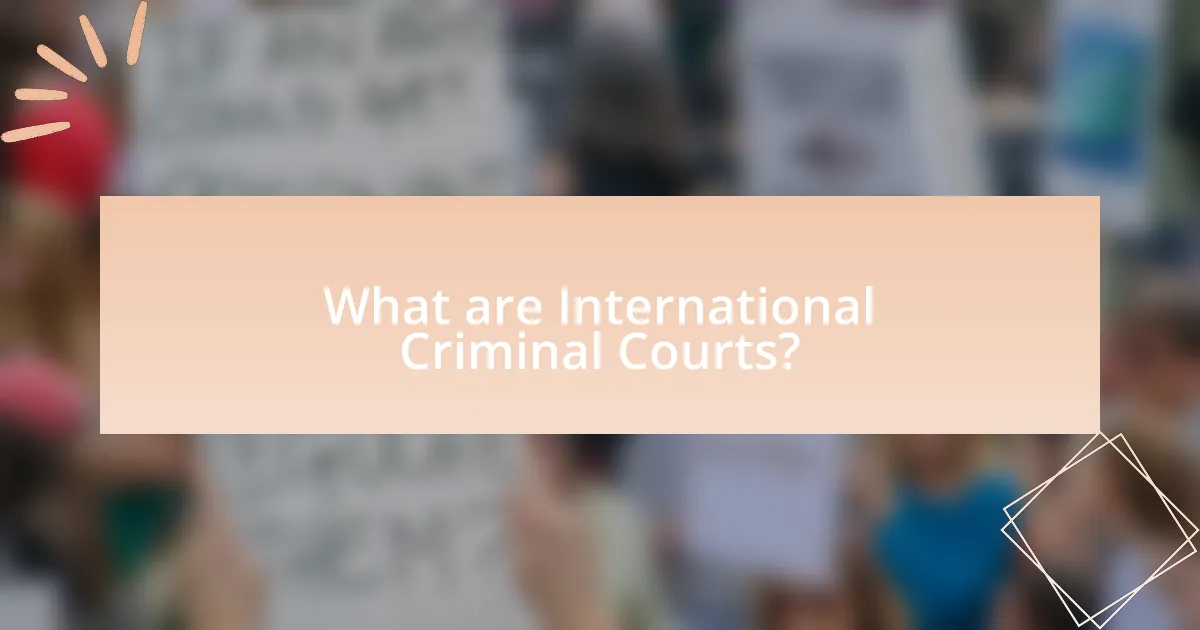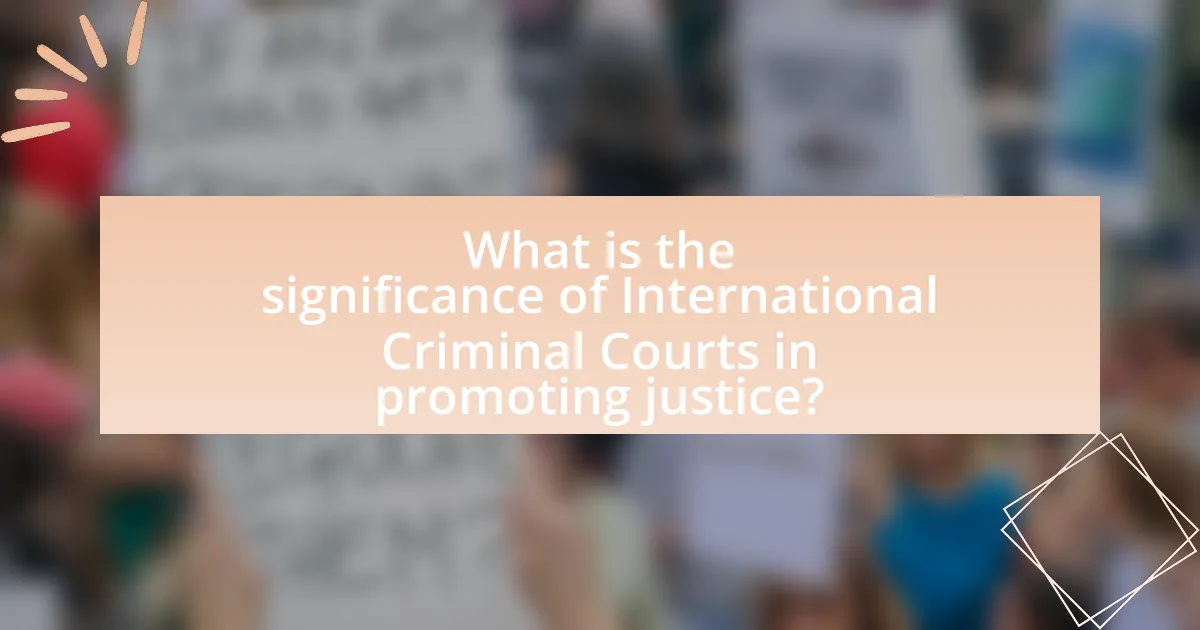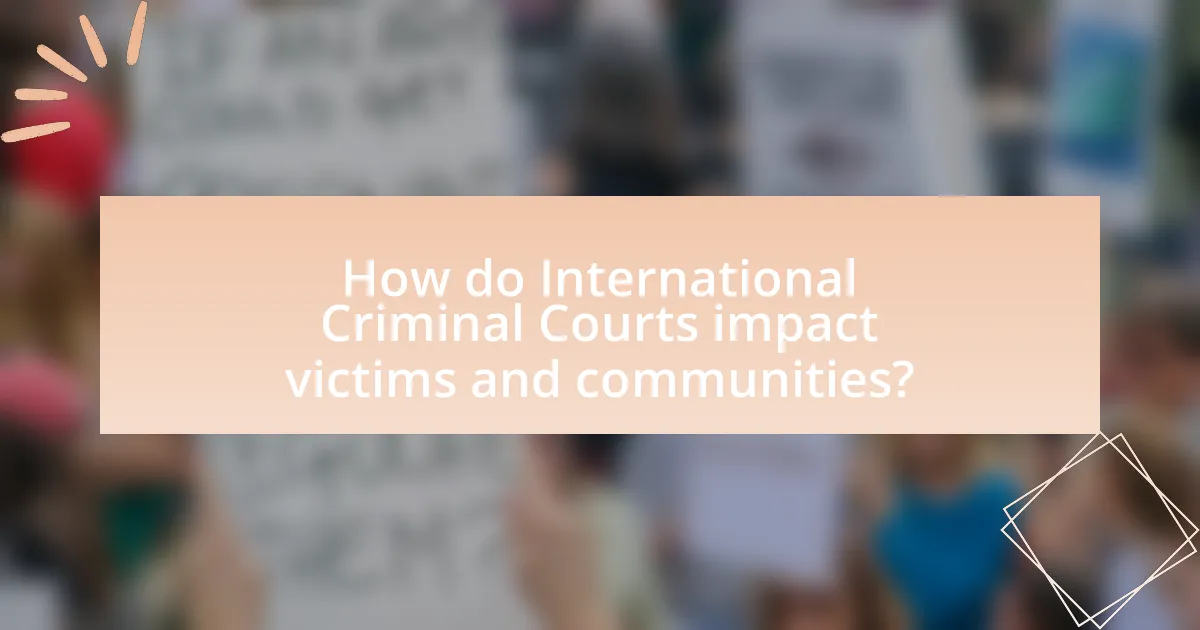International Criminal Courts (ICCs) are judicial institutions established to prosecute individuals for serious international crimes, including genocide, war crimes, and crimes against humanity. The article outlines the functions, key components, and historical context of ICCs, particularly focusing on the International Criminal Court (ICC) established in 2002 under the Rome Statute. It discusses the significance of these courts in promoting justice and accountability, the challenges they face, and the impact on victims and communities. Additionally, the article explores future prospects for ICCs, proposed reforms, and best practices to enhance their effectiveness in addressing global justice issues.

What are International Criminal Courts?
International Criminal Courts are judicial institutions established to prosecute individuals for serious international crimes, such as genocide, war crimes, and crimes against humanity. These courts, including the International Criminal Court (ICC), operate under international law and aim to hold accountable those responsible for egregious violations that threaten global peace and security. The establishment of the ICC in 2002, governed by the Rome Statute, exemplifies the international community’s commitment to justice and the rule of law, providing a permanent tribunal to address such crimes when national courts are unwilling or unable to do so.
How do International Criminal Courts function?
International Criminal Courts function by adjudicating cases involving serious international crimes such as genocide, war crimes, and crimes against humanity. These courts operate under established legal frameworks, primarily the Rome Statute for the International Criminal Court (ICC), which outlines their jurisdiction, procedures, and the rights of the accused. The courts gather evidence, conduct trials, and deliver verdicts based on international law, ensuring accountability for perpetrators. For instance, the ICC has successfully prosecuted individuals like Thomas Lubanga for war crimes, demonstrating its role in enforcing international justice.
What are the key components of International Criminal Courts?
The key components of International Criminal Courts include jurisdiction, legal framework, prosecution, defense, and enforcement mechanisms. Jurisdiction defines the court’s authority to hear cases, typically covering crimes such as genocide, war crimes, and crimes against humanity. The legal framework consists of treaties and statutes, such as the Rome Statute for the International Criminal Court, which outlines the court’s functions and procedures. Prosecution involves the Office of the Prosecutor, responsible for investigating and initiating cases, while the defense ensures the rights of the accused are upheld during trials. Enforcement mechanisms are crucial for ensuring compliance with court decisions, often relying on cooperation from states to arrest and surrender suspects. These components work together to uphold international law and deliver justice for serious crimes.
How do these components interact within the judicial process?
International criminal courts interact with various components of the judicial process, including legal frameworks, prosecutorial bodies, defense mechanisms, and victim participation. These components work collaboratively to ensure accountability for international crimes, such as genocide and war crimes. For instance, the legal framework establishes jurisdiction and procedural rules, while prosecutorial bodies gather evidence and present cases against alleged perpetrators. Defense mechanisms provide representation for the accused, ensuring fair trials, and victim participation allows affected individuals to engage in the process, contributing to restorative justice. This interaction is essential for upholding the rule of law and delivering justice on an international scale.
Why were International Criminal Courts established?
International Criminal Courts were established to prosecute individuals for serious international crimes such as genocide, war crimes, and crimes against humanity. These courts aim to ensure accountability, deter future atrocities, and provide justice for victims. The establishment of the International Criminal Court (ICC) in 2002, following the Rome Statute, marked a significant step in the global effort to address impunity for the gravest offenses recognized under international law.
What historical events led to the creation of these courts?
The creation of international criminal courts was primarily driven by the aftermath of World War II, particularly the Nuremberg Trials, which established accountability for war crimes and crimes against humanity. These trials highlighted the need for a permanent judicial mechanism to address such atrocities, leading to the establishment of the International Criminal Court (ICC) in 2002 through the Rome Statute. The ICC was designed to prosecute individuals for genocide, war crimes, and crimes against humanity, reflecting a global consensus on the necessity of international justice mechanisms following the widespread violations observed during the Holocaust and other conflicts.
How do International Criminal Courts address global justice issues?
International Criminal Courts address global justice issues by prosecuting individuals for crimes such as genocide, war crimes, and crimes against humanity. These courts, including the International Criminal Court (ICC), operate under international law to hold perpetrators accountable, thereby promoting accountability and deterring future atrocities. The establishment of the ICC in 2002, governed by the Rome Statute, exemplifies this commitment to justice, as it provides a legal framework for investigating and prosecuting serious offenses that threaten global peace and security. By enforcing international norms and standards, these courts contribute to the establishment of a global justice system that seeks to uphold human rights and provide redress for victims.

What is the significance of International Criminal Courts in promoting justice?
International Criminal Courts (ICCs) play a crucial role in promoting justice by holding individuals accountable for serious international crimes such as genocide, war crimes, and crimes against humanity. These courts provide a legal framework that transcends national jurisdictions, ensuring that perpetrators cannot evade justice by seeking refuge in their home countries. For instance, the International Criminal Court (ICC), established by the Rome Statute in 2002, has prosecuted high-profile cases, including those against former leaders like Laurent Gbagbo of Ivory Coast and Omar al-Bashir of Sudan, thereby reinforcing the principle that no one is above the law. This accountability fosters a sense of justice for victims and contributes to the deterrence of future crimes, ultimately promoting global peace and security.
How do International Criminal Courts contribute to accountability?
International Criminal Courts contribute to accountability by prosecuting individuals for serious crimes such as genocide, war crimes, and crimes against humanity. These courts, including the International Criminal Court (ICC), establish legal precedents that deter future violations and promote adherence to international law. For instance, the ICC has successfully prosecuted high-profile cases, such as the conviction of former Congolese warlord Thomas Lubanga in 2012 for enlisting child soldiers, demonstrating the court’s role in holding perpetrators accountable. This legal framework not only seeks justice for victims but also reinforces the principle that individuals, regardless of their position, can be held responsible for their actions under international law.
What types of crimes do these courts prosecute?
International criminal courts prosecute serious crimes such as genocide, war crimes, crimes against humanity, and the crime of aggression. These courts, including the International Criminal Court (ICC), are established to hold individuals accountable for these egregious offenses that violate international law and threaten global peace and security. The Rome Statute, which governs the ICC, explicitly defines these crimes and outlines the jurisdiction of the court, ensuring that perpetrators are brought to justice and victims receive recognition and redress.
How does prosecution in these courts differ from national courts?
Prosecution in international criminal courts differs from national courts primarily in jurisdiction and scope. International courts, such as the International Criminal Court (ICC), prosecute individuals for serious crimes like genocide, war crimes, and crimes against humanity, which transcend national boundaries and require a global response. In contrast, national courts typically handle domestic crimes under their own legal systems and laws.
Additionally, international prosecutions often involve a more complex legal framework, including treaties and international law, which govern the proceedings and ensure accountability on a global scale. For example, the Rome Statute established the ICC and outlines its jurisdiction, emphasizing the principle of complementarity, where national courts are primarily responsible unless they are unwilling or unable to prosecute. This framework highlights the international community’s commitment to addressing egregious offenses that may be overlooked by national jurisdictions.
What challenges do International Criminal Courts face?
International Criminal Courts face significant challenges, including issues of jurisdiction, enforcement, and political interference. Jurisdictional challenges arise when states are unwilling to cooperate or when crimes occur in regions not recognized by the court, limiting the court’s ability to prosecute offenders. Enforcement challenges stem from the lack of a dedicated police force to arrest suspects, as seen in cases where indicted individuals remain at large due to state non-cooperation. Political interference often complicates proceedings, as powerful nations may influence the court’s actions or decisions, undermining its impartiality and effectiveness. These challenges hinder the courts’ ability to deliver justice and hold perpetrators accountable for international crimes.
How do political influences affect the operations of these courts?
Political influences significantly affect the operations of international criminal courts by shaping their jurisdiction, funding, and the enforcement of their rulings. For instance, states may exert pressure on these courts to prioritize certain cases or avoid others based on geopolitical interests, which can lead to selective justice. Additionally, funding for these courts often comes from member states, creating a dependency that can influence judicial independence. The International Criminal Court (ICC), for example, has faced challenges in executing arrest warrants due to non-cooperation from states that are politically aligned with the accused, illustrating how political dynamics can hinder the court’s effectiveness in delivering justice.
What are the limitations of jurisdiction for International Criminal Courts?
International Criminal Courts (ICCs) face several limitations of jurisdiction, primarily including territoriality, nationality, and the principle of complementarity. Territoriality restricts ICC jurisdiction to crimes committed within the territory of states that are party to the Rome Statute or have accepted the court’s jurisdiction. Nationality limits the court’s ability to prosecute individuals unless they are nationals of a state party or the crime occurred in a state party’s territory. The principle of complementarity asserts that ICCs can only intervene when national courts are unwilling or unable to prosecute serious crimes, which can hinder the court’s ability to act in situations where local jurisdictions are functioning. These limitations are established in the Rome Statute, which governs the ICC’s operations and jurisdictional scope.

How do International Criminal Courts impact victims and communities?
International Criminal Courts impact victims and communities by providing a platform for justice and accountability for crimes such as genocide, war crimes, and crimes against humanity. These courts enable victims to seek redress and recognition of their suffering, which can contribute to healing and reconciliation within affected communities. For instance, the International Criminal Court (ICC) has facilitated reparations for victims, as seen in the case of Thomas Lubanga, where victims received compensation for their suffering. Additionally, the presence of these courts can deter future atrocities by signaling that perpetrators will face consequences, thereby fostering a sense of security and promoting the rule of law in communities recovering from conflict.
What role do victims play in the proceedings of International Criminal Courts?
Victims play a crucial role in the proceedings of International Criminal Courts by participating in the judicial process, which includes providing testimony, submitting evidence, and seeking reparations. Their involvement is recognized under various legal frameworks, such as the Rome Statute of the International Criminal Court, which allows victims to present their views and concerns during trials. This participation not only aids in establishing the facts of the case but also ensures that the voices of those affected by crimes are heard, contributing to a more comprehensive understanding of the impact of the crimes. Furthermore, the courts often provide mechanisms for victims to claim reparations, reinforcing their role in the pursuit of justice and accountability.
How are victims’ rights protected during trials?
Victims’ rights are protected during trials through legal frameworks that ensure their participation and consideration in the judicial process. International criminal courts, such as the International Criminal Court (ICC), implement measures like allowing victims to present their views and concerns, providing them with legal representation, and ensuring their right to privacy and protection from intimidation. For instance, the Rome Statute of the ICC explicitly recognizes the rights of victims to participate in proceedings and to seek reparations, thereby reinforcing their role in the justice process. These protections are essential for upholding the dignity of victims and ensuring that their voices are heard in the pursuit of justice.
What support systems are available for victims involved in these courts?
Victims involved in international criminal courts have access to various support systems, including legal assistance, psychological counseling, and victim protection programs. Legal assistance is provided to help victims navigate the complexities of the judicial process, ensuring their rights are upheld. Psychological counseling services are available to address the trauma experienced by victims, facilitating their emotional recovery. Additionally, victim protection programs are implemented to safeguard victims from potential retaliation or intimidation, thereby promoting their safety and well-being throughout the legal proceedings. These support systems are crucial for empowering victims and ensuring their participation in the justice process.
What are the future prospects for International Criminal Courts?
The future prospects for International Criminal Courts (ICCs) include increased jurisdiction, enhanced cooperation among states, and a focus on accountability for war crimes and human rights violations. As global awareness of justice issues rises, ICCs are likely to expand their reach to address crimes that transcend national boundaries, such as cybercrime and environmental crimes. Furthermore, the establishment of new treaties and agreements may facilitate greater collaboration between ICCs and national legal systems, improving the enforcement of international law. Historical precedents, such as the establishment of the International Criminal Court in 2002, demonstrate a growing commitment to international justice, suggesting that ICCs will continue to evolve and adapt to emerging global challenges.
How can International Criminal Courts evolve to better serve justice?
International Criminal Courts can evolve to better serve justice by enhancing their procedural efficiency and expanding their jurisdiction. Improving procedural efficiency can be achieved through streamlined case management systems, which would reduce delays in trials and increase the speed of justice delivery. For instance, the International Criminal Court (ICC) has faced significant backlogs, with some cases taking years to reach a verdict; implementing technology-driven solutions could mitigate this issue. Expanding jurisdiction to include a broader range of crimes, such as environmental crimes or cybercrimes, would allow these courts to address contemporary global issues and provide justice for victims of a wider array of offenses. This evolution is supported by the increasing recognition of the need for accountability in various forms of transnational crime, as highlighted in reports from organizations like Human Rights Watch.
What reforms are being proposed to enhance the effectiveness of these courts?
Proposed reforms to enhance the effectiveness of international criminal courts include increasing funding, improving case management systems, and strengthening cooperation with national jurisdictions. Increased funding is essential for expanding resources and personnel, which can lead to more efficient trial processes. Improved case management systems can streamline proceedings and reduce delays, addressing the backlog of cases that often hampers justice. Strengthening cooperation with national jurisdictions can facilitate the enforcement of court decisions and enhance the overall effectiveness of international legal frameworks. These reforms aim to create a more responsive and efficient judicial system capable of addressing complex international crimes.
What best practices can be adopted for the effectiveness of International Criminal Courts?
To enhance the effectiveness of International Criminal Courts, best practices include ensuring judicial independence, promoting victim participation, and enhancing cooperation with national jurisdictions. Judicial independence is crucial as it allows judges to make impartial decisions free from external pressures, which is supported by the principle of fair trial rights outlined in the International Covenant on Civil and Political Rights. Promoting victim participation empowers those affected by crimes to engage in the judicial process, thereby increasing the legitimacy and perceived fairness of the court, as evidenced by the Rome Statute’s provisions for victim involvement. Lastly, enhancing cooperation with national jurisdictions facilitates the enforcement of court decisions and the apprehension of suspects, which is vital for the court’s operational success, as demonstrated by the International Criminal Court’s reliance on state cooperation for investigations and prosecutions.